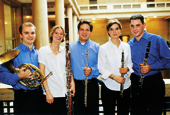 |
| Some members of the Orsolino Quintet |
It is rather a pity when excellent musicians choose to play entertaining, but forgettable, music. The Orsolino Quintet from Berlin ? performing on December 12 ? is made up of five woodwind players from Germany and Austria, who play in first-rate orchestras like the Berlin Philharmonic and the Leipzig Gewandhaus. Their effortless virtuosity was evident throughout the concert. Yet the music they chose to play so flawlessly was quite unremarkable ? technically difficult, amusing, sometimes plaintive and experimental, but ephemeral and lacking in depth. Calcutta deserved better, in spite of its mobile phones and applause between movements.
The early-Beethoven Adagio and Allegro (originally written for a mechanical clock) was civilised and Mozartian, particularly the Papagenoesque allegro. Delectable music, but evidently written to grace a Viennese count?s cabinet of curiosities. The Quintet in F by Beethoven?s contemporary, Franz Danzi, was just the sort of regulation Classicism, straddling court and conservatory, that both Mozart and Beethoven would parody or complicate at their most brilliant moments. Nice, tidy and predictable, it to-ok no risks and broke no rules.
The more complex fun began with Gy?rgy Ligeti?s Six Bagatelles of the Fifties. This Hungarian ?migr? had a sharp sense of the distinct personality of each wind instrument, its individual texture of humour or melancholy. Moving between the playful and the plaintive, this piece goes beyond virtuosity towards elegy, especially when it remembers Bart?k. Originally written for the piano, its title also pays homage to the late-Beethoven bagatelles. Ligeti?s eleven-note experiment is rooted in Hungarian song and dance, yet alludes to the Austrian-German heritage that would nurture him subsequently. Paul Hindemith?s Little Chamber Mu-sic of the early Twenties again provided parody, caricature and display of skills. But, by this time, ear and mind were craving for more. After all, Mozart did write those beautiful serenades.
Luciano Berio?s contemporary Opus Number Zoo at the end was a paler shade of Walto-?s Fa?ade that had so memorably used Edith Sitwell?s poe-ms. Berio makes the musicians play and recite four animal poems by the New York-based opera-director and children?s writer, Rhoda Levine. ?That?s all, folks,? ends her Barn Dance, quite in the less-than-fulfilling spirit of the entire evening.










